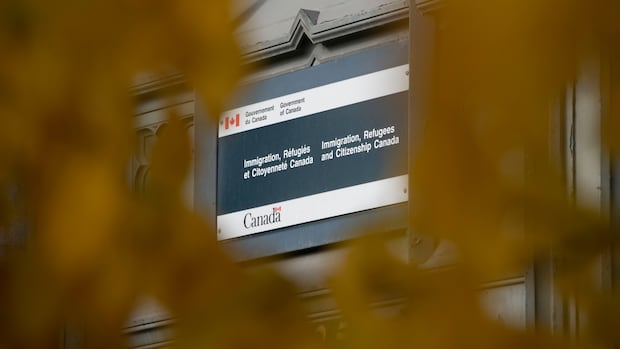OttawaAs the federal government’s funding to house asylum seekers in hotels comes to an end later this month, families and the organizations helping them are feeling anxious and say there are few answers about what comes next.IRCC encouraging families to leave province, advocates say claimants risk homelessnessAdvocates say asylum seekers facing dire housing choices as federal hotel funding ends Earlier this summer, Immigration, Refugees and Citizenship Canada said funding for hotel operations will end Sept. 30. The department said it would help those still in hotels find longer-term housing before the program ends. But with just one week left, organizations that help asylum seekers in the capital say the families they work with are scrambling. As the federal government’s hotel program to house asylum seekers comes to an end this month, advocates are demanding answers and local solutions for Ottawa families, especially as government officials encourage claimants to relocate to other regions — even as far as the Maritimes.Earlier this summer, Immigration, Refugees and Citizenship Canada (IRCC) said funding for hotel operations will end Sept. 30. The department said it would help those still in hotels find longer-term housing before the program ends. But with just one week left, organizations that help asylum seekers in the capital say the families they work with are scrambling.”They are terrified. They’ve been told they have to be out, that there’s a deadline, and if they don’t find somewhere to live it’s not IRCC’s problem,” said Louisa Taylor, executive director of Refugee 613, a non-profit coalition supporting refugees.”At the same time, they’ve been searching and searching, but they can’t afford the private market.”IRCC said on Sept. 17 it was housing 136 asylum claimants in one Ottawa hotel. Advocates say many of them are families with young children.The federal government has been funding hotels for asylum seekers across Canada for years, meant as a stopgap measure to deal with historic surges in migration. The department said it’s spent approximately $1.1 billion on temporary hotel housing since 2020. Though IRCC has said it would assist claimants to find alternative housing before the deadline, those working with them say the reality on the ground is different.”The people whose future is at stake are not being informed, and so in the absence of information it’s utterly … so stressful,” Taylor said.Louisa Taylor with Refugee 613 says asylum seekers who are being forced to leave the IRCC-funded hotels are receiving few answers about what happens next. (Francis Ferland/CBC)Stéfanie Morris with Community Legal Services of Ottawa is one of several refugee lawyers in the city working directly with affected claimants and collaborating to find solutions.She’s called IRCC agents to try to find answers and was told claimants could relocate to New Brunswick, or find rental accommodation.”That’s just not financially feasible for some of these families,” said Morris, who also practises housing law. “The options they’ve been given are not responsive to their needs.”Morris said the city told her it can offer help only once the claimants are actually homeless. She said “it’s IRCC’s responsibility” to arrange a smooth transition for those people. “It can’t simply be that it ends on Sept. 30 and no concrete solutions are offered,” she said.Morris is asking for a transition strategy that doesn’t rely on municipalities “to pick up the slack” when shelters are full.Immigration, Refugees and Citizenship Canada is ending a program to fund hotel stays for asylum seekers on Sept. 30. (Ivanoh Demers/Radio-Canada)City advising families to moveShea Kiely, executive director of Housing Help, said the wait for subsidized housing in the city is years long, and shelters and transitional housing are full.”So we anticipate that Sept. 30, our phone is going to be extra busy,” said Kiely, whose organization provides services to prevent housing loss and help people find affordable options. Families with children are especially having a hard time, Kiely said. She gave an “absolutely heartbreaking” example of a client who’s living outdoors with her children. Others have to call city shelters daily in the hope of securing a place to stay.”There’s so many families in need and not enough spots,” Kiely said. “It’s very scary times.”Shea Kiely is executive director of Housing Help, an Ottawa not-for-profit that helps prevent housing loss and helps people find affordable housing. She says displacing people again is not an effective solution. (Nick Persaud/CBC)The City of Ottawa reiterated that family shelters are over capacity. In a statement, the city’s interim director of housing and homelessness Kale Brown said Ottawa is in “close communication” with IRCC and committed to smooth and safe transitions for families leaving the hotels. Brown pointed to IRCC’s offer of alternate placements for claimants, and urged families to consider going. “The City advises families accept these placement options as the City’s shelter system is operating over capacity and does not have the resources to accommodate additional asylum claimants,” Brown wrote.Brown said while the city recently acquired additional buildings to house single newcomers, it’s still looking to expand shelters for families and recently launched a procurement process to lease or buy a space to accommodate homeless families.IRCC spokesperson Isabelle Dubois said in a statement the department is working with other levels of governments to help transition claimants “into stable housing,” but didn’t share any further details.”IRCC continues to provide support for those still on site in securing housing solutions prior to Sept. 30,” Dubois wrote.Relocation not necessarily the answerOlivia Huynh, executive director of New Brunswick Refugee Clinic, said there’s been a flow of transfers of asylum claimants to the province this summer. She said it’s because the federal government struck a deal with the province to allocate more economic immigration spots, in lieu of accepting more refugee claimants.She said her region faces similar affordable housing challenges, and claimants don’t have access to legal aid there. Her organization wouldn’t have capacity to meet the demand of new transfers from Ontario, she said.”We really need to prioritize their well-being and their needs to make sure they’re successfully established, and not to treat them as bargaining chips,” Huynh said.Olivia Huynh is a lawyer and executive director the New Brunswick Refugee Clinic. She says there’s similar housing affordability issues in that province, and not many organizations that can provide legal help to claimants. (Pierre Fournier/CBC)Advocates say displacing Ottawa families again could be incredibly challenging for them, as some have found jobs and their children are already enrolled in local schools.Morris reminds Ottawans that it’s historically been a welcoming community, and hopes that will continue to be the case.”They’re people who experienced persecution and who have come here because they needed a safe haven,” Morris added. “There’s this binary that says that we can only serve Canadians or refugee claimants, and that binary is false. We can do both.”ABOUT THE AUTHORPriscilla Ki Sun Hwang is a reporter with CBC News based in Ottawa. She’s worked with the investigative unit, CBC Toronto, and CBC North in Yellowknife, Whitehorse and Iqaluit. She has a Master of Journalism from Carleton University. Want to contact her? Email priscilla.hwang@cbc.ca
Thursday, 5 Mar 2026
Canada – The Illusion
Search
Have an existing account?
Sign In
© 2022 Foxiz News Network. Ruby Design Company. All Rights Reserved.
You May also Like
- More News:
- history
- Standing Bear Network
- John Gonzalez
- ᐊᔭᐦᑊ ayahp — It happened
- Creation
- Beneath the Water
- Olympic gold medal
- Jim Thorpe
- type O blood
- the bringer of life
- Raven
- Wás’agi
- NoiseCat
- 'Sugarcane'
- The rivers still sing
- ᑲᓂᐸᐏᐟ ᒪᐢᑿ
- ᐅᑳᐤ okâw — We remember
- ᐊᓂᓈᐯᐃᐧᐣ aninâpêwin — Truth
- This is what it means to be human.
- Nokoma











